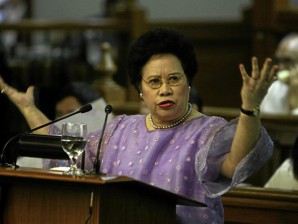Santiago absent; prosecution heaves sigh of relief
Relief was written all over the elfin face of Representative Niel Tupas Jr.
The chief of the House prosecution team broke into a smile when it was announced that Sen. Miriam Defensor-Santiago would be absent Monday.
Without her, the nationally televised courtroom drama took a more sedate—if civil—air.
Tupas was one of the prosecutors that provoked Santiago’s fury last week. The senator, who has a reputation as a tiger trial judge, had blasted them for not doing their homework and engaging her in debates.
At one point last week, Santiago’s blood pressure shot up, forcing her to make an early exit during one of the hearings in Senate’s impeachment trial of Chief Justice Renato Corona.
Article continues after this advertisementIn a letter to Senate President Juan Ponce Enrile, the presiding officer, Santiago on Monday revealed that she was again suffering from hypertension, which had prompted her to miss the first week of the trial.
Article continues after this advertisement“This morning, after getting up from bed, my blood pressure was registered at 180/100. After medication, it is now 160/90. These figures constitute the basis for the continuing diagnosis of hypertension, indicative of a possible stroke. Hence, I have to stay at home,” Santiago said.
She did not say if Tupas was haunting her.
Santiago requested the Senate secretariat to record her absence “on sick leave.”
Sought for comment, Tupas chuckled: “We hope she gets well soon. We miss her brilliance.”
Representative Romero Quimbo, a prosecution spokesperson, said: “We want her here. She increases the viewership 10 times.”
Rejiggering yet again
Without Santiago, it took the prosecution less than 10 minutes to move for the reordering—yet again—of the presentation of evidence on the eight articles of impeachment against Corona for culpable violation of the Constitution, betrayal of public trust and graft and corruption.
The senator went bananas in an earlier rejiggering of the articles.
Instead of the sequence of presentation earlier revealed to the court—the prosecution had said it wanted to begin with Articles 2,1 and 7—Tupas appealed to the “liberality” of the court to allow the new order of presentation.
Defense objection
From Article 2, which deals with Corona’s non-filing of statement of assets, liabilities and net worth, the prosecution will present evidence on Articles 3,7,1,8,4,5 and 6.
The lead defense counsel, Serafin Cuevas, objected.
“The proposed change now is entirely an overhaul of the said previous order made known to court. We do not question the prerogative and authority of the prosecution to determine the order of presentation… but there was already a previous order,” Cuevas explained.
“We see no reason why there should again be a deviation. Otherwise, there would be no end. Another set up in another day and further delay! We are not saying we are not prepared … but it is also the part of the right of the Chief Justice to due process,” he added.
Tupas insisted that Articles 2 and 3 are related and that discussing them one after the other would result in a more “orderly presentation.”
“Article 2 is about the dishonesty of the Chief Justice while Article 3 is about moral fitness. It goes with the storyline and proper presentation of our case,” he added.
“We won’t change it again,” Tupas promised Enrile.
She can’t keep still
Since Santiago showed up on January 24, not a day had passed that she did not stand up to scold either Tupas or private prosecutor Arthur Lim on legal procedures and rules of evidence.
But even in her absence, Santiago wanted the court to resolve a procedural issue.
She asked Senate Majority Leader Vicente Sotto, in another letter, “to read for me the question that I prepared for this afternoon.”
The question, as read by Sotto, said:
“If there is no objection from our colleagues in the court, could each of the panels please submit a list of witnesses, listing them either as primary witnesses, or as corroborative witnesses? When the court is finished with this information then the court could be guided in stopping further evidence consisting of corroborative witnesses.”
Enrile said that Santiago’s comment was placed “under advisement.” With reports from Cathy C. Yamsuan and Cynthia D. Balana
